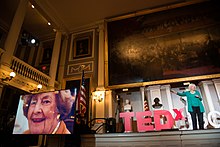Ellen Goodman
Ellen Goodman (née Holtz; born April 11, 1941) is an American journalist and syndicated columnist. She won a Pulitzer Prize in 1980.[1] She is also a speaker and commentator.
Ellen Goodman | |
|---|---|
 Ellen Goodman gives a TEDx Talk | |
| Born | April 11, 1941 |
| Nationality | American |
| Alma mater | Radcliffe College |
| Awards | Pulitzer Prize 1980 |
Career
Goodman's career began as a researcher and reporter for Newsweek magazine between 1963 and 1965. She was a reporter at the Detroit Free Press starting in 1965 and has worked as an associate editor at The Boston Globe since 1967. Her column was syndicated by The Washington Post Writers Group in 1976.
In 1996, she taught at Stanford University as the first Lorry I. Lokey Visiting Professor in Professional Journalism.[2] In 1998, Goodman received the Elijah Parish Lovejoy Award as well as an honorary Doctor of Laws degree from Colby College. She compared "anthropogenic warming deniers" to holocaust deniers.[3] She announced her retirement in her final column, which ran on January 1, 2010.[4]
Education
Goodman attended Brookline High School in Brookline, Massachusetts for two years and graduated in 1959 from Buckingham School, now Buckingham Browne & Nichols.[5] She graduated cum laude from Radcliffe College in 1963 with a degree in modern European history. A year later, she returned to Harvard as a Nieman Fellow. At Harvard, Goodman studied the dynamics of social change. In 2007, Goodman studied gender and the news at John F. Kennedy School of Government where she was a Shorenstein Fellow.[2]
Personal life
Goodman was born to Jewish family[6][7] in Newton, Massachusetts to Jackson Jacob Holtz, and Edith (née Weinstein) Holtz. Her elder sister was the late critic and author Jane Holtz Kay. She married her first husband, Anthony Goodman, in 1963 and in 1968, gave birth to their daughter Katie Goodman, a musical comedian.[8] After the couple divorced, she married Boston Globe journalist Robert Levey in 1982. Her stepson, Gregory Levey, died by self-immolation in 1991 protesting the First Gulf War.[9][10][11][12]
Awards
Goodman won the Pulitzer Prize for Commentary in 1980.[1] Another accolade is the American Society of Newspaper Editors' (now the American Society of News Editors) Distinguished Writing Award (1980). In 1988, Goodman won the Hubert H. Humphrey Civil Rights Award from the Leadership Conference on Civil Rights.[13]
She was awarded the President's Award by the National Women's Political Caucus in 1993. A year later, she was given the American Woman Award by the Women's Research & Education Institute.[14] In 2008, she won the Ernie Pyle Award for Lifetime Achievement from the National Society of Newspaper Columnists.[15] She was awarded the Ashoka Fellowship in 2014 for her work.
The Conversation Project
In 2010, Goodman started "The Conversation Project", a group dedicated to the wishes of end-of-life care. Goodman serves as the co-founder and director of the group.
Books
- Turning Points (1979)
- Close to Home (1979)
- At Large (1981)
- Keeping in Touch (1985)
- Making Sense (1989)
- Value Judgments (1993)
- I Know Just What You Mean: the power of friendship in women's lives (2000), by Goodman and Patricia O'Brien
- Paper Trail: common sense in uncommon times (2004)
Primal Screen
References
- Profile, pulitzer.org; accessed March 29, 2015; retrieved 2013-10-31.
- Profile, ellengoodman.com; accessed March 29, 2015.
- Ellen Goodman, "No Change in Political Climate", The Boston Globe, February 9, 2007.
- Ellen Goodman, "Ellen Goodman writes of letting go in her final column", The Washington Post, January 1, 2010.
- Ritchie, Anne (April 9, 1993). "Ellen Goodman Interview #1". Washington Press Club Foundation. Retrieved December 30, 2013.
- Jewish Journal: "When Jews on the Left See Americans on the Right as Nazis" by Dennis Prager May 4, 2010
- Los Angeles Times: "Of Secrecy and Paranoia: What Is Inman's Real Story?" by Suzanne Garment January 23, 1994 |Inman named five journalists who had treated him badly: Safire, Tony Lewis, Ellen Goodman, the cartoonist Herblock and Rita Braver. All five are Jewish
- Profile Archived December 18, 2010, at the Wayback Machine, postwritersgroup.com; accessed March 29, 2015.
- "Twenty Years Ago Today -- Immolation Revolutions Now; And the Ones to Come" Archived 2013-11-02 at the Wayback Machine, warisacrime.org; accessed March 29, 2015.
- Amherst Suicide Victim Was A Substitute Teacher, articles.philly.com; accessed March 29, 2015.
- Amherst Journal; Candles in the Snow Honor Suffering.
- "He Was An 'Undramatic Guy' Town Remembers Man Who Set Himself Afire Over Gulf War", articles.sun-sentinel.com; accessed March 29, 2015.
- "1988 Humphrey Award Recipients". The Leadership Conference website. Archived from the original on December 31, 2013. Retrieved December 31, 2013.
- "American Woman Award". The Women's Research & Education Institute. Archived from the original on October 6, 2006. Retrieved December 31, 2013.
- "Lifetime Achievement Hall of Fame". National Society of Newspaper Columnists website. Retrieved December 31, 2013.
Further reading
- Wymard, Ellie (1999). Conversations with uncommon women insights from women who've risen above life's challenges to achieve extraordinary success. New York: AMACOM. ISBN 0585119872. OCLC 77354855.
External links
| Wikiquote has quotations related to: Ellen Goodman |
| Library resources about Ellen Goodman |
| By Ellen Goodman |
|---|
- Official website
- Brief bio at the Boston Globe
- Conservation Project
- Ellen Goodman Articles
- Ellen Goodman at Library of Congress Authorities, with 10 catalog records
- Appearances on C-SPAN